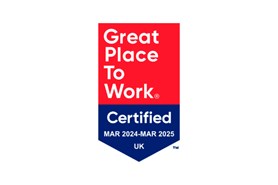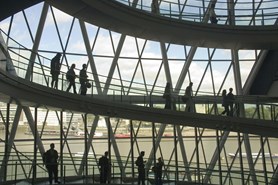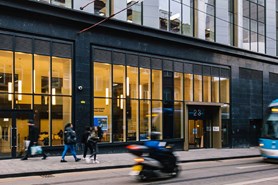The HS2 cancellation further dents our image on the Global stage. We are not seen as strong and stable, more weak and wobbly.
One of the privileges I enjoy in my role is having the opportunity to meet business people from around the world who shape the built environment on a global stage. In these situations, the reputation of the UK is paramount.
With limited exceptions, we are regarded as an important and relatively stable market in which to invest and operate. London alone had a GDP of around £497bn in 2020 and output is now 4.4% above pre pandemic levels. It is by far the fastest growing part of the UK. We also are the nation epitomised by industrial giants of the past like Isambard Kingdom Brunel, Christopher Wren, Sir Humphrey Davey and the Cubitt brothers.
This position, underlined by our heritage of historical achievements, is by no means guaranteed, however. The debate, procrastination and recent decision to amputate part of the HS2 project, joining Manchester to Birmingham, is a sad metaphor of our decline in the world. We have dropped a long way in the tables of global recognition and admiration since we created the 2012 Olympics with its stadium, infrastructure and management being the envy of the world.
The Tory Party conference held in Manchester was originally bemused by the speculation of possible cuts, planted by the Prime Minister, apparently without reference to Network Rail and then when the announcement of the cancellation of the second leg of the line came it was about as welcome in the North as a Russell Brand tribute act in the Rovers Return.
The scope of the project has already changed three times in three years – with each change drawing criticism at home and disparaging glances from investors abroad. Rumours of overspend and complaints of project drift are all to be expected with a programme of this scale, but they should not deter the government from providing a high-speed link that can act as a bridge between the more prosperous South East and aspirational North.
Returning to the London 2012 Summer Olympics. Recent numbers from the UK department of trade and industry suggest that the UK economy gained over £13.3bn in benefits from its staging. Most don’t now refer to the fact that it also came in nearly three times over budget! HS2 has even greater potential to deliver economic benefits in the long-term if the government was able to hold its nerve, address the issues and proceed with the original blueprint.
To continue its growth, London needs input from the likes of Birmingham, Manchester and Leeds and those cities need faster, more reliable and fluent access to their neighbours and the capital to enhance their development. That’s to say nothing of the needs of the 30,000 people already working to deliver the project and the businesses investing in these areas, based on the promise of improved connectivity.
Its no wonder that Andy Burnham, Mayor of Greater Manchester was fuming. The Greater Manchester Combined Authority’s HS2 & Northern Powerhouse Rail (NPR) Growth Strategy was set to double the economic output of Greater Manchester to £132bn by 2050, delivering 96,000 jobs and 16,800 homes, as well as widespread regeneration. During construction alone, HS2 would have supported 17,500 jobs in the Northwest.
It is by no means certain that the sticking plaster approach of supporting branch lines will deliver the same metrics. Also the decision arguably hobbles the skills agenda (and early careers commitments) by removing long-term planning for clients, contractors, consultants and regional suppliers. Using a regional supply chain and low carbon construction are two of the selling points for HS2. However a PM that is now championing the motorist and reducing green commitments is perhaps not going to be unduly concerned by those considerations.
I’ll admit, I am pleased that I am not a politician seeking to balance financial priorities and I understand that it is impossible to do everything all at once. But the yo-yoing and U-turns are not good for business. Our global partners hate indecision and uncertainty. The tone for business is set by our politics and when policies are debated to death and revised or revisited so often, it creates jitters. A large set piece infra project like HS2 is not a short term whimsy that can be managed well by a neurotic accountant. It is a long term, far sighted investment creating jobs, spreading opportunity and allowing UK to put the fiasco of the last few years economic illiteracy behind it. Now overseas investors look at the UK and wonder whether we are the same country that produced Cross Rail, the Channel Tunnel and the Elizabeth Line.
The American chair of Birmingham City FC, Tom Wagner has already evidenced this point, writing to the PM to urge the government to ‘honour its commitment’ to deliver on HS2 in full. He warned that ‘any deviation could result in a loss of investor trust and this would have a considerable negative impact on the UK’. I agree. The reputational damage of scrapping part of a transformational project like HS2 is enormous, and the PM initially announcing his decision during the Tory party conference in the North is an act of political self-evisceration not seen since Liz Truss and Kwasi Kwarteng gave their first and thankfully, only budget. One cabinet minister was apparently heard to say, that the trouble with Rishi Sunak is that as a politician he is just not very good at Politics.
Having an outside perspective on the way the world views the UK is both helpful and revealing. From my travels I can assure you we do still have a huge well of goodwill and brand equity from which we can draw. Let’s not fritter it away with short term thinking, shallow sound bites and reverse ferret policies.

Richard Steer
Chairman
- richard.steer@gleeds.com
- +44 (0)207 631 7000



